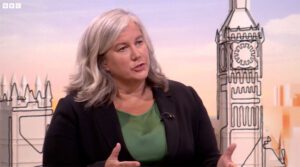The government will act to make electric vehicles (EVs) more affordable for UK drivers, Transport Secretary Heidi Alexander has confirmed, though she stopped short of pledging direct subsidies—despite reports suggesting a £700 million support package may be imminent.
Appearing on Sunday with Laura Kuenssberg, Alexander promised that new measures to cut the cost of EV ownership would be announced later this week. However, she declined to confirm whether these would include up-front grants for consumers, as reported by The Telegraph.
Instead, the government has unveiled an £88 million package focused on improving charging infrastructure, including £25 million for local councils to install “cross-pavement gullies”—designed to help residents without driveways charge EVs outside their homes. A further £63 million will be allocated to expanding charging points across the UK, with a focus on creating better signposting and larger EV charging hubs on major A-roads.
Alexander said: “We are going to be making some announcements later this week on how we make it more affordable for people to buy an electric vehicle.
I can guarantee to your viewers that we will be making it cheaper for those who do want to make the switch.”
The government’s position has been cautiously welcomed by motoring groups, but critics argue the approach lacks urgency and ambition. AA president Edmund King said improving visibility and access to charging points was “vital” to boost driver confidence, while motoring journalist Quentin Wilson, a long-time EV advocate, said the government had moved “far, far too slowly”.
The affordability of EVs remains one of the biggest barriers to widespread adoption. The average cost of a new electric car in the UK is nearly double that of a petrol equivalent—around £22,000 versus £12,000—though Chinese manufacturers are beginning to enter the market with models starting from £18,000.
Sales of EVs made up about 20% of all new car registrations in the first half of 2025, according to figures from the Society of Motor Manufacturers and Traders (SMMT), but remain well below the mandated targets ahead of the 2030 ban on the sale of new petrol and diesel vehicles.
Opposition parties have criticised Labour’s plans. Richard Fuller MP, the shadow chief secretary to the Treasury, accused the government of “forcing families into more expensive electric vehicles before the country is ready.”
The Transport Secretary defended the shift, highlighting the need for a dual-pronged approach that tackles both the lack of charging infrastructure and the high up-front costs of switching to electric. But when asked if she personally owned an EV, Alexander admitted she did not.
“I don’t have an electric car,” she said. “Like millions of people in this country—I bought a new car about six years ago. I’m thinking about the next car I’ll purchase and it will definitely be electric.”
Alexander also acknowledged the challenges for drivers without off-street parking, noting that terraced homes and flat dwellers often face higher charging costs and limited overnight options. The proposed “cross-pavement gullies” aim to alleviate some of these difficulties by allowing cables to safely stretch across pavements to parked cars.
In April, the government eased EV manufacturing targets to give automakers more flexibility and reduce penalties, in a move designed to address concerns about rising trade tariffs from the US.
As anticipation builds for Labour’s full EV affordability package later this week, stakeholders across the motor, energy and tech sectors will be watching closely to see if the UK government follows through on its pledge to drive the electrification of Britain’s roads.
Read more:
Government pledges cheaper electric cars but ducks subsidy confirmation

